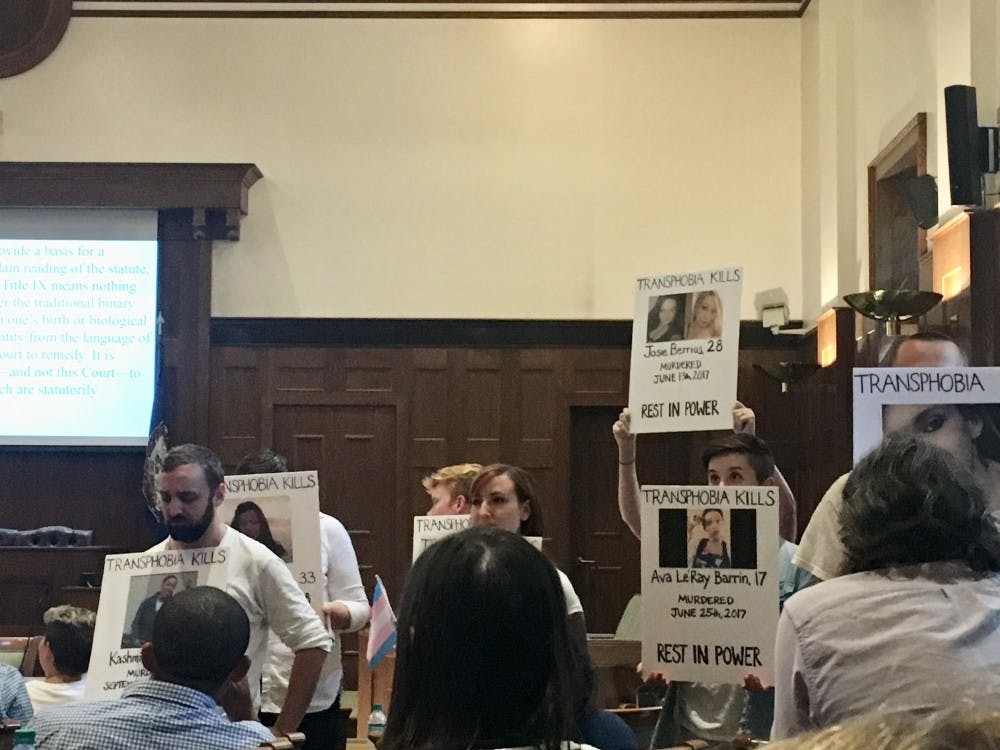Ryan T. Anderson, author of When Harry Became Sally: Responding to the Transgender Moment, spoke yesterday at the T.C. Williams School of Law. Anderson was invited by the Federalist Society, a “conservative and libertarian” group of law students, to speak on the legal matters of his book.
Anderson's invitation incited protests from both students and faculty.
Law school dean Wendy Perdue emailed law students defending Anderson’s talk.
“As an academic institution, we’re committed to open and robust discussion, and I note that, consistent with these principles, the students who invited this speaker have also invited a faculty member to respond to Mr. Anderson’s remarks,” Purdue stated in her email.
Perdue also emailed UR staff, explaining, “Our practice at the law school is to allow student groups to invite their own speakers without pre-clearing them with the administration.”
Anderson centered his talk around chapter eight of his book, which considers law and public policy, and spoke about how he hopes the legal system will protect both cisgender and transgender people but believes that it discriminates against cisgender people.
“We’re not saying that this facility is for cisgender students and this facility is for transgender," Anderson said. "Instead, what the policies are is all students, whether you identify as cisgender or transgender, if you’re biologically male, you may use this facility."
Anderson also spoke about the impacts of Title IX policy on transgender people.
“Even if you thought that Title IX, the word sex meant gender identity — which I think is rather implausible given the actual text, the history — the structure of the statute of these policies that the schools are enacting don’t discriminate on the basis of gender identity,” Anderson said.
Throughout Anderson’s talk, student protesters who were seated in the front row held signs of trans people who were killed or committed suicide because of transphobia. Protesters were encouraged to wear all white.

Anderson emphasized his commitment to people's safety and said he believed policy surrounding trans people was best enacted at the local and state levels.
Enjoy what you're reading?
Signup for our newsletter
“We want the laboratories of democracy to spin out better or worse ways," he said. "Then we can learn from these laboratories the best way."
Anderson also said he had a problem with the “transgender worldview.”
“You can have a much more expansive understanding of gender without thinking that makes you the opposite sex," he said. "I’ll speak for myself here, I think that lots of the transgender worldview is doubling down on sex stereotypes.”
A few students criticized Anderson for prioritizing the safety of cisgender people over transgender people, specifically on the issue of women’s bathrooms.
“We want to protect both those who identify as trans from violence, and we want to protect women who have been sexually assaulted,” he responded.
Students also asked Anderson about the high rate of transgender suicides. According to the National Transgender Discrimination Survey, 41% of trans people surveyed have attempted suicide.
“They’re tragic, and they’re unacceptable,” Anderson said. Based on current studies, he said, medically transitioning is not as beneficial to trans people as is presumed, and they should seek help elsewhere.
“Current therapies aren’t working sufficiently," he continued. "What they should do is prompt all of us, whatever side of political or ideological sides we’re on, to work to find better responses to people who are struggling with gender dysphoria."
Many students said they were surprised at the civility of the event.
“Coming into this was really hard for me because it’s really easy to vilify someone when you haven’t met them,” said Liam Lassiter, a sophomore and transgender student.
Lassiter was among the students wearing white and holding signs during the talk. He spoke with Anderson personally after the event.
“It’s hard to hate someone when you meet them,” he said.
First-year law student Erin Kidd said she was encouraged by the event.
“I came because I wanted to see things be discussed in a calm and civil manner, which I was very happy to see done here," she said. "It did not seem at first, when the emails about this started going out, that that was going to be how this was handled. This is a good first step to having those open discussions."
Lassiter disagreed. Although he said he appreciated the calm manner of the talk, he said: “I feel like I’m not worthy or welcome here. I’m just something to be talked about.”
It was this sentiment that encouraged students to organize a protest.
“We wanted to celebrate trans people and also point out how damaging people like Ryan Anderson are to trans people,” said Gianna Fienberg, a third year law student who helped organize the protest. Fienberg emphasized the group effort that went into the protest for the “celebration and education” of trans people.
“We wanted to let people express themselves how they felt like they needed to,” Fienberg said.
The Federalist Society has not replied to requests for comment.
Support independent student media
You can make a tax-deductible donation by clicking the button below, which takes you to our secure PayPal account. The page is set up to receive contributions in whatever amount you designate. We look forward to using the money we raise to further our mission of providing honest and accurate information to students, faculty, staff, alumni and others in the general public.
Donate Now



